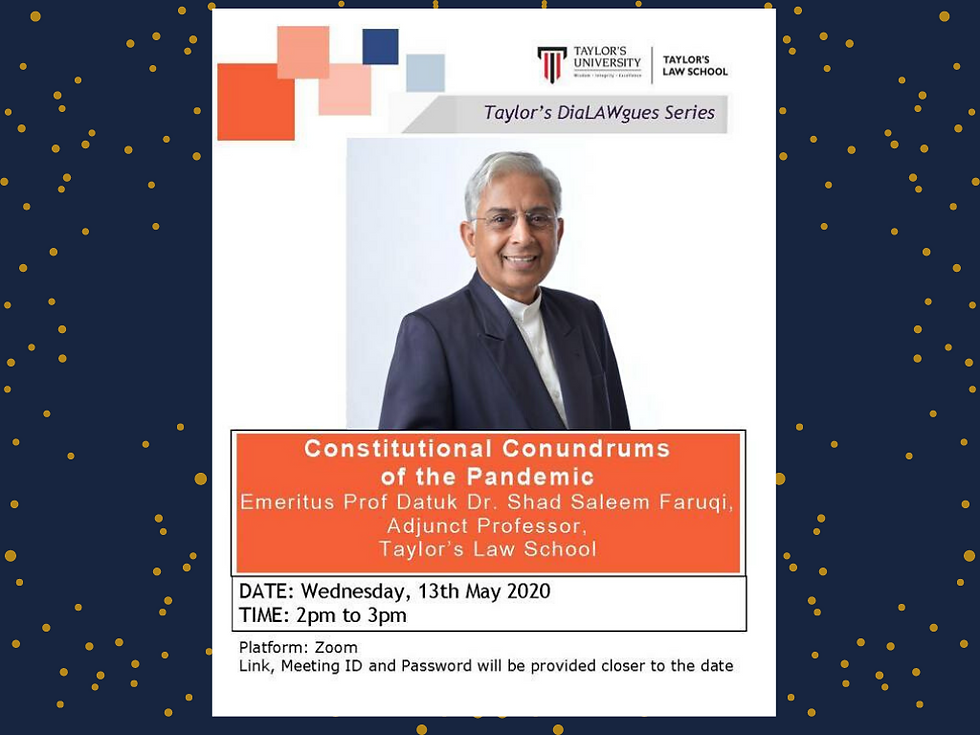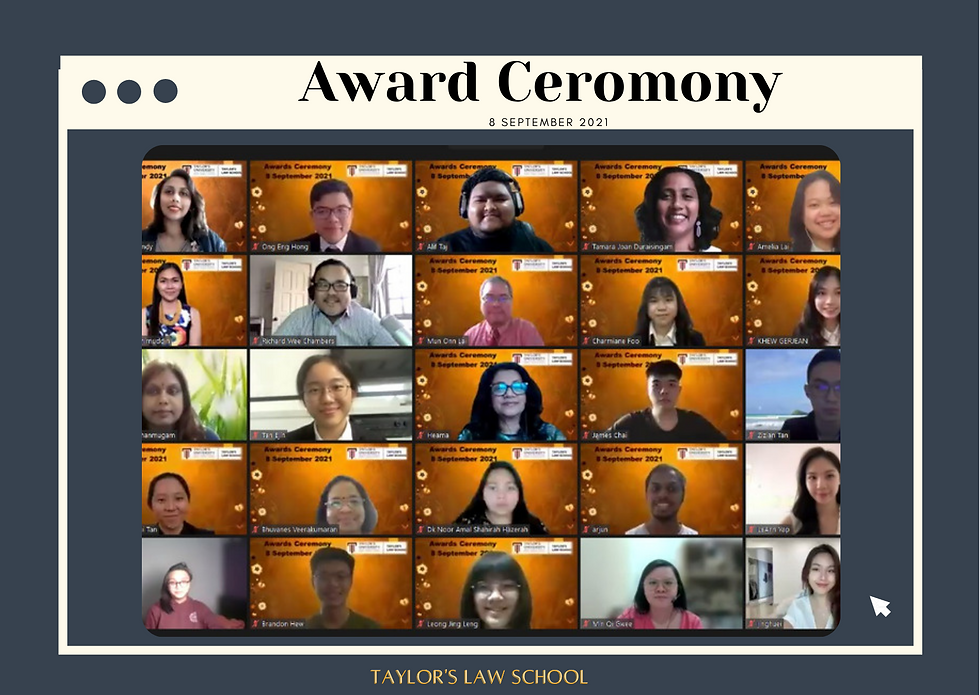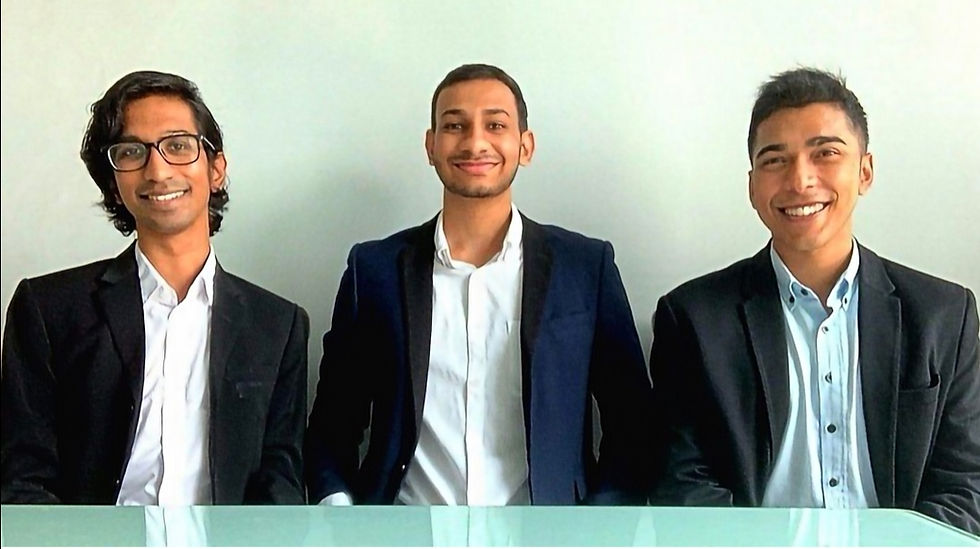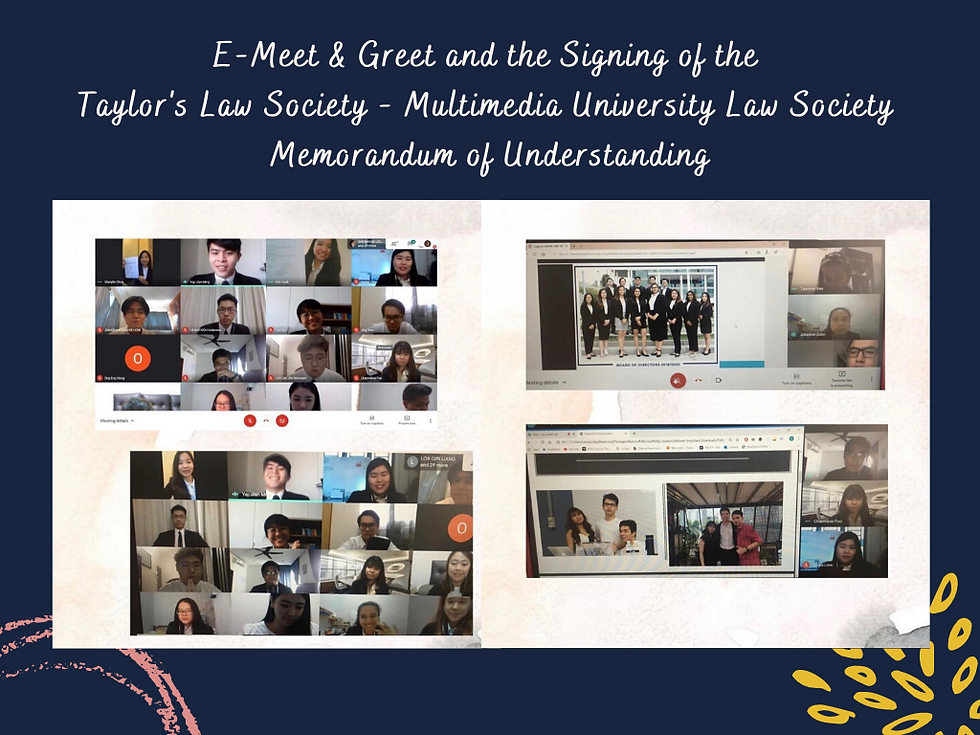Constitutional Conundrums on the Pandemic
- Tan Ejin
- Jul 1, 2020
- 4 min read

On 13 May 2020, Taylor’s Law School had the honour of having Emeritus Prof Datuk Dr. Shad Saleem Faruqi to share his thoughts on the constitutional challenges we are facing in the midst of a public health crisis.
The fundamental principles of the rule of law are embodied in our Federal Constitution, where it prescribes that “no person shall be made to suffer in body or goods except for a distinct breach of law established in the ordinary legal manner before the ordinary courts”. Prof observed that the current health crisis seemed to have given the executive government an excuse to move towards more authoritarianism governance.
The Constitution guards some fundamental liberties of every citizen, and in some cases, every person. This includes personal liberty, the right to equal protection under the law, freedom of movement, freedom of religion and the right to property. Where there is a need for deterrence and maintaining order, “the law must be proportionate” in achieving these aims. He pointed out the blatant cases of unequal treatment in remands and court sentences for those who touted the Movement Control Order (MCO) are not ones that reflected proportionality.
Moreover, with the MCO in place, the legality of the executive government’s decisions is questionable. One such example was the economic stimulus package announced by the Prime Minister which amounted to RM 260 billion. Despite it being a noble intention to assist affected groups, Prof maintained that the government has no power to withdraw any money from the Consolidated Fund without parliamentary authority.
“Parliament is the keeper of the purse and its authority is needed to raise or spend money,” he said.
Hence, it can be said that the executive government has acted ultra vires the powers conferred to them. Having said that, such authority to withdraw funds can be given retrospectively.
Furthermore, the recently implemented Conditional Movement Control Order (CMCO) offers another look into the federal-state relation in Malaysia, where nine out of thirteen states were not in sync with the federal government’s order. Matters of public health, sanitation and the prevention of disease are classified under Item 7 of the Concurrent List, where both state and the federal government have the power to legislate in these areas. Thus, one may argue that the states have every right to do as they wish as they are still acting within their powers.
However, Prof is of the opinion that “this view is overly optimistic” due to several reasons, namely item 7 in the Concurrent List is merely an enabling provision, the void in state laws are filled by the federal government’s Prevention and Control of Infectious Diseases Act 1988, and that the preponderance of power and responsibility in hands of the federal government is a clear feature of our quasi-federal system. In the long run, however, he commented that “some readjustment, decentralisation and devolution is needed for a more equitable distribution of power” within the federation.
Other than that, the current pandemic has made fundamental flaws in our Federal Constitution evident. With regards to the Parliamentary sittings in Malaysia, Prof admitted that he was shocked to learn that there is no minimum number of sittings in a year prescribed in our Constitution. It merely states the permissible lapse between the last parliamentary sitting and the next sitting to be no more than 6 months. Due to this, one can see that “Parliament’s life and its deliberation are under executive control.”
Thus, it would be constitutionally valid if the executive government decides to hold the next sitting after the May 18 session in November. Though unlikely to happen as a July 13 session for 15 days and a budget session are on the cards, this Constitutional flaw is no doubt a significant one.
Having experienced our first hung parliament in history last February and in an era where minority governments are becoming more popular worldwide, Prof foresees more incidents of party-hopping in the future. This political instability is relevant to be discussed with Article 150 of the Constitution where the Yang di-Pertuan Agong is vested the power to issue a Proclamation of Emergency when the security, economic life or public order of the country is threatened, as advised by the Cabinet. Following this, ordinances issued under such circumstances would not be subjected to judicial review. Thus, he warned that this may bring about “a temptation for future governments to exercise the emergency powers to solve problems”.
While it is true that we live in very uncertain times, Prof drew a conclusion that the current pandemic has demonstrated the necessity of having good governance around the world.
“In the bulk of democratic states, democracy exists only in name. It has been captured by the political, economic and military elite who constitute the deep state or the state within the state, Democracy has metamorphosed into a government of a few, by the few, for the few,” he said.
He strongly believes that governments must uphold just laws and principles, effective institutions, fair processes, accessible remedies when rights are infringed and most importantly, good leadership.
Unfortunately, in the corridors of power today, there are people who have been exerting that the Constitution, the laws, Parliament, democracy and the rule of law are not the priority at the moment. With all due respect, Prof emphasised that health and economic considerations must operate within a legal framework and should not give way to authoritarianism.
“In good and bad times, the Constitution and the law should be respected,” he shared.



Comments